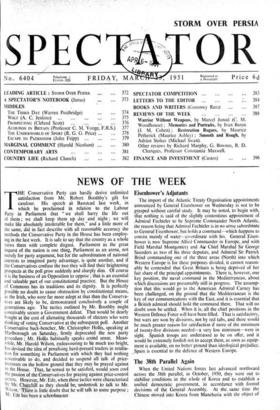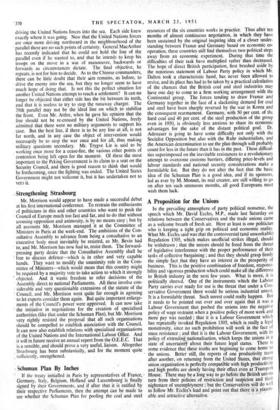The 38th Parallel Again When the United Nations forces last
advanced northward -across the 38th parallel, in October, 1950. they were out to stabilise conditions in the whole of Korea and to establish a unified democratic government, in accordance with formal decisions of the General Assembly. At the same time the Chinese moved into Korea from Manchuria with the object of driving the United Nations forces into the sea. Each side knew exactly where it was going. Now that the United Nations forces are once more driving northward in the neighbourhood of the parallel there are no such points of certainty. General MacArthur has recently indicated that he could not hold the line of the parallel even if he wanted to, and that he intends to keep his troops on the move in a war of manoeuvre, backwards or forwards as circumstances dictate. The final objective, he repeats, is not for him to decide. As to the Chinese commanders, there can be little doubt that their aim remains, as before, to drive the enemy into the sea, but they no longer seem to have much hope of doing that. Is not this the perfect situation for another United Nations attempt to reach a settlement? It can no longer be objected that either side has the bit between its teeth, and that it is useless to try to stop the runaway charger. The 38th parallel may not be the ideal line on which to stabilise the front. Even Mr. Attlee, when he gave his opinion that the line should not be re-crossed by the United Nations, freely admitted that there were no military arguments to support his case. But the best line, if there is to be any line at all. is not far north, and in any case the object of intervention would necessarily be to stop the war once and for all, thus making military questions secondary. Mr. Trygve Lie is said to be working once more for a cease-fire, the various other points of contention being left open for the moment. Of these the most important to the Peking Government is its claim to a seat on the Security Council, and there is good reason to think that would be forthcoming, once the fighting was ended. The United States Government might not welcome it, but it has undertaken not to veto it.



































